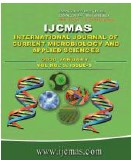


 National Academy of Agricultural Sciences (NAAS)
National Academy of Agricultural Sciences (NAAS)

|
PRINT ISSN : 2319-7692
Online ISSN : 2319-7706 Issues : 12 per year Publisher : Excellent Publishers Email : editorijcmas@gmail.com / submit@ijcmas.com Editor-in-chief: Dr.M.Prakash Index Copernicus ICV 2018: 95.39 NAAS RATING 2020: 5.38 |
In India 82 per cent of farmers are small and marginal farmers whose acreage is less than 2 ha. These farmers play a pivotal role in Indian economy. Majority of these farmers practicing mono crop cultivation. Discouraging results of monoculturing (non-integrated system) on crop productivity, led to the development of integrated farming system (IFS) strategy which enables adequate income, employment, nutritional security and eco friendly. IFS has many advantages over the monoculturing. IFS has proven to be the most viable option representing various combinations of agriculture and allied activities viz. cropping system, horticulture, forestry, livestock, poultry, goatery, sericulture, duckery, fishery etc. Different components of the IFS have complementary effects on one other, by-products or waste of one component will be the food or source of energy for the other component, there by reduces the environmental pollution through recycling of farm waste generated within the farm itself and it reduces the dependence on outside farm inputs (cost effective). Animal and plant waste directly or by composting is added to soil, as the large amount of farm waste will be generated in the IFS because of integration and it helps in improving the soil physical, chemical and biological health. Small and marginal farmers livelihood will be improved and sustained by the adoption of IFS technologies on a large scale all over the India, which enables to double the income of farmers on same piece of land with improved employment and meeting the nutritional requirements of the farm family.
 |
 |
 |
 |
 |